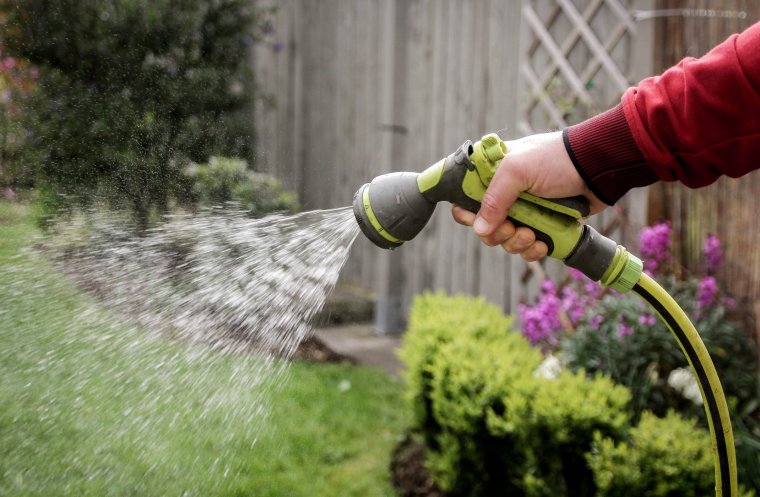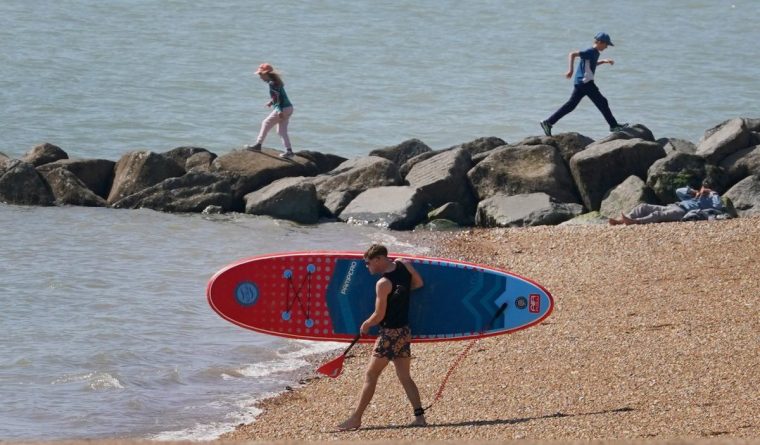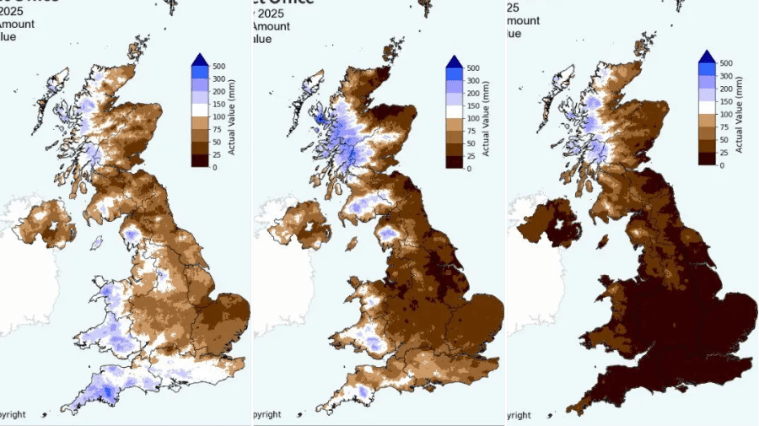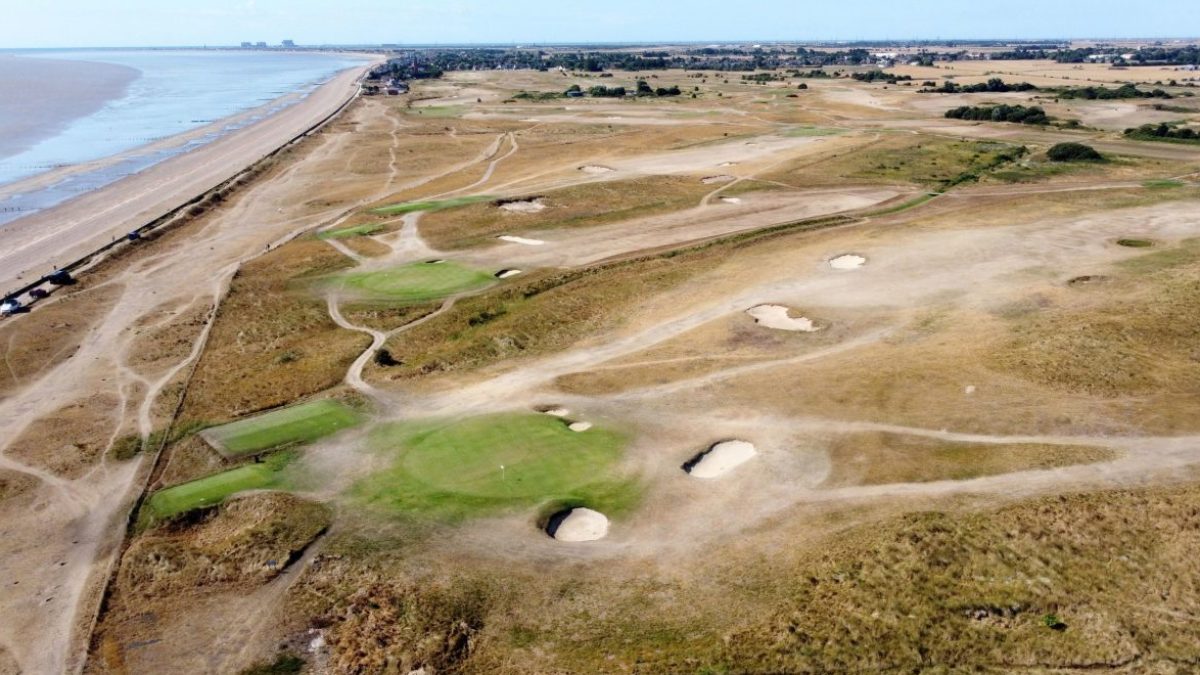Those who do not follow a hosepipe ban can be prosecuted through criminal courts and fined up to £1,000
The UK faces the prospect of hosepipe bans within weeks if the exceptionally dry and warm conditions of the past two months continue for much longer, experts warn.
The country recorded only 43 per cent of its average rainfall in March. England and Wales recorded just a quarter of the monthly average and within England, the Thames and Wessex regions received just 13 per cent of their long-term averages.
These rainfall has been well below average since October and and it has been getting even drier since in February.
And while data for April will not be published until Thursday, Met Office rainfall maps for the period until 28 April show levels similar to those in March – leaving a depletion in river levels and groundwater supplies.
It comes as many areas of Britain will experience a mini heatwave this week with the mercury soaring as high as 30°C.
Temperatures are expected to continue to rise throughout the week, with meteorologists anticipating highs of 30°C on Thursday in England.
 Water experts say the country is in a similar position as this point in 2022 – when six water companies went on to introduce hosepipe bans in July affecting around 20 million people (Photo: Kinga Krzeminska/Getty Images)
Water experts say the country is in a similar position as this point in 2022 – when six water companies went on to introduce hosepipe bans in July affecting around 20 million people (Photo: Kinga Krzeminska/Getty Images) Dover has had warmer temperatures this week. Many areas of Britain will experience a mini heatwave this week with the mercury soaring as high as 30°C (Photo: PA)
Dover has had warmer temperatures this week. Many areas of Britain will experience a mini heatwave this week with the mercury soaring as high as 30°C (Photo: PA)
“We’ve seen quite a significant departure from average, with about half the amount of rain we’d normally see in the UK at this point in spring,” said Met Office meteorologist Dr Aidan McGivern.
“I know a lot of people are crying out for rain but it doesn’t look like, away from the north of Scotland, we are going to see an awful lot of it through next week.
“And that is not going to do wonders for the rainfall totals that we’re seeing across the UK this spring,” he said, adding that the spring weather has also been extremely warm.
“I wouldn’t be surprised if its the warmest March, April period on record,” he said.
As March was the 10th warmest on record (and the sunniest) this suggests that April could comfortably be the warmest on record, although Dr McGivern’s comment is not a definitive prediction.
What happens if you break a hosepipe ban?
Water companies can enact hosepipe bans under the Flood and Water Management Act 2010.
A hosepipe ban covers the following activities, among others:
- Watering of a garden using a hosepipe
- Cleaning of a private vehicle using a hosepipe
- Watering of plants on domestic or other non-commercial premises using a hosepipe
- Cleaning of a private leisure boat using a hosepipe
- Filling or maintenance of a domestic swimming or paddling pool (whether by using a hosepipe or using other means, for example by filling it with a bucket)
- Drawing of water (eg. from a river) using a hosepipe for domestic recreational use
A person who contravenes a ban may be prosecuted through criminal courts and fined up to £1,000.
Steve Turner, a hydrologist at the UK Centre for Ecology & Hydrology (UKCEH), told The i Paper that “late spring rainfall will be influential in dictating the outlook for the summer”.
He notes that the Met Office long-range forecast indicates that average rainfall is likely across the UK in May, June and July.
“However, starting from an already dry baseline, it may take very wet conditions for river flows and groundwater levels to return to normal conditions,” he added.
“If dry conditions persist over the next few months, water companies may begin to implement strategies such as increasing communications for customers about water efficiency and reduced usage and, if necessary, hosepipe bans.”
Water specialists say the country is in a similar position as it was at this point in 2022 – when six water companies went on to introduce hosepipe bans in July that affected around 20 million people.
Alistair Chisholm, director of policy at the Chartered Institution of Water and Environmental Management (CIWEM), told The i Paper: “If the weather carries on for another couple of months on the same trajectory that it has done in the last two months, then I see no reason why we wouldn’t see hosepipe bans.
 Rainfall records for January, February and March 2025 (Photo: Met Office)
Rainfall records for January, February and March 2025 (Photo: Met Office)
“This spring feels incredibly familiar to spring 2022. In that year we went from a situation of totally comfortable water resources in the winter – everything pretty much topped up – to a really quite dicey situation where six water companies were bringing in hose pipe bans by July.
“That was because of an exceptionally dry spring which became an exceptionally hot early summer.”
Mr Chisholm added: “If it is this dry for a prolonged period of time, then hosepipe bans and water challenges are a likelihood.
“We haven’t done anything since 2022 that is really meaningfully going to change the situation.
“We haven’t built any more reservoirs, the Government haven’t moved any water efficiency polices on in that time. So if we get very similar conditions we’ll end up in a very similar place.”
Mr Chisholm pointed out that, of course, “it could pour with rain in May or June” meaning any risk could be averted. But, on the other hand, “we could see hosepipe bans coming in earlier than in 2022”.
“One of the criticisms of that year was the application process for temporary use ban permits was still paper-based with a slow turnaround time,” he added.
“This meant that by the time bans were actually brought in we were deep into drought and ideally companies would have brought those measures in many weeks earlier to slightly ease some pressures.”
Predicting which areas are at highest risk of hosepipe bans is not as simple as analysing recent rainfall patterns and temperatures.
It also depends on population numbers, local reservoir capacity and how much of the water supply comes from groundwater.
A Water UK spokesperson said: “During this hot weather everyone can do their part to save water and protect the environment by making small changes to everyday routines at home and in the garden.
“Over the next five years, water companies will start work on nine new reservoirs as part of their record £104bn investment to secure our water supplies, help build more homes, and support economic growth.”
A Defra spokesperson said: “After years of failure, this Government has inherited a crumbling water system which population growth and climate change is putting a tremendous strain on.
“It’s why the Government has secured a record £104bn of private sector investment to upgrade and build new infrastructure, including nine new reservoirs to secure our future water supply into the decades to come.”
